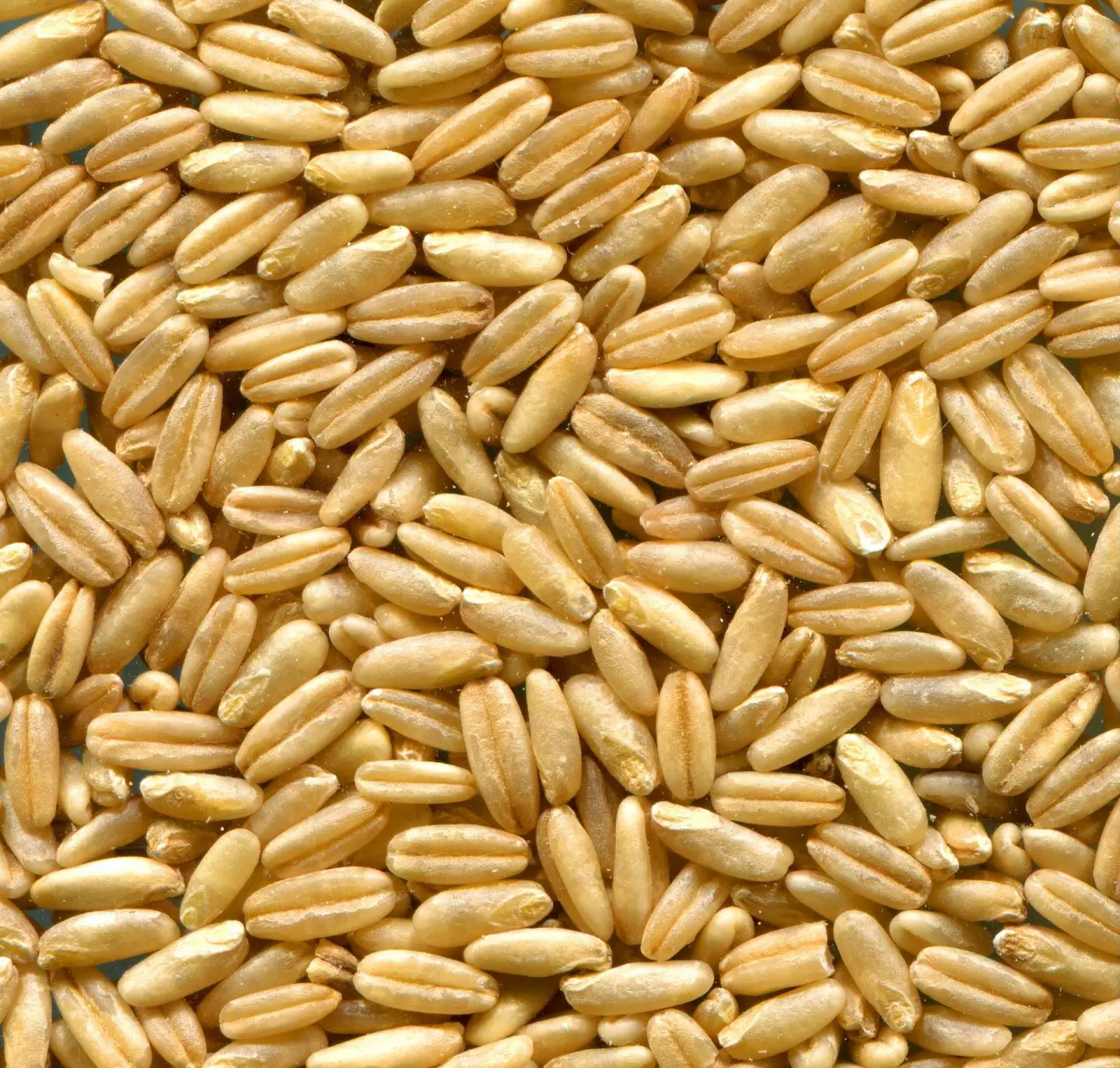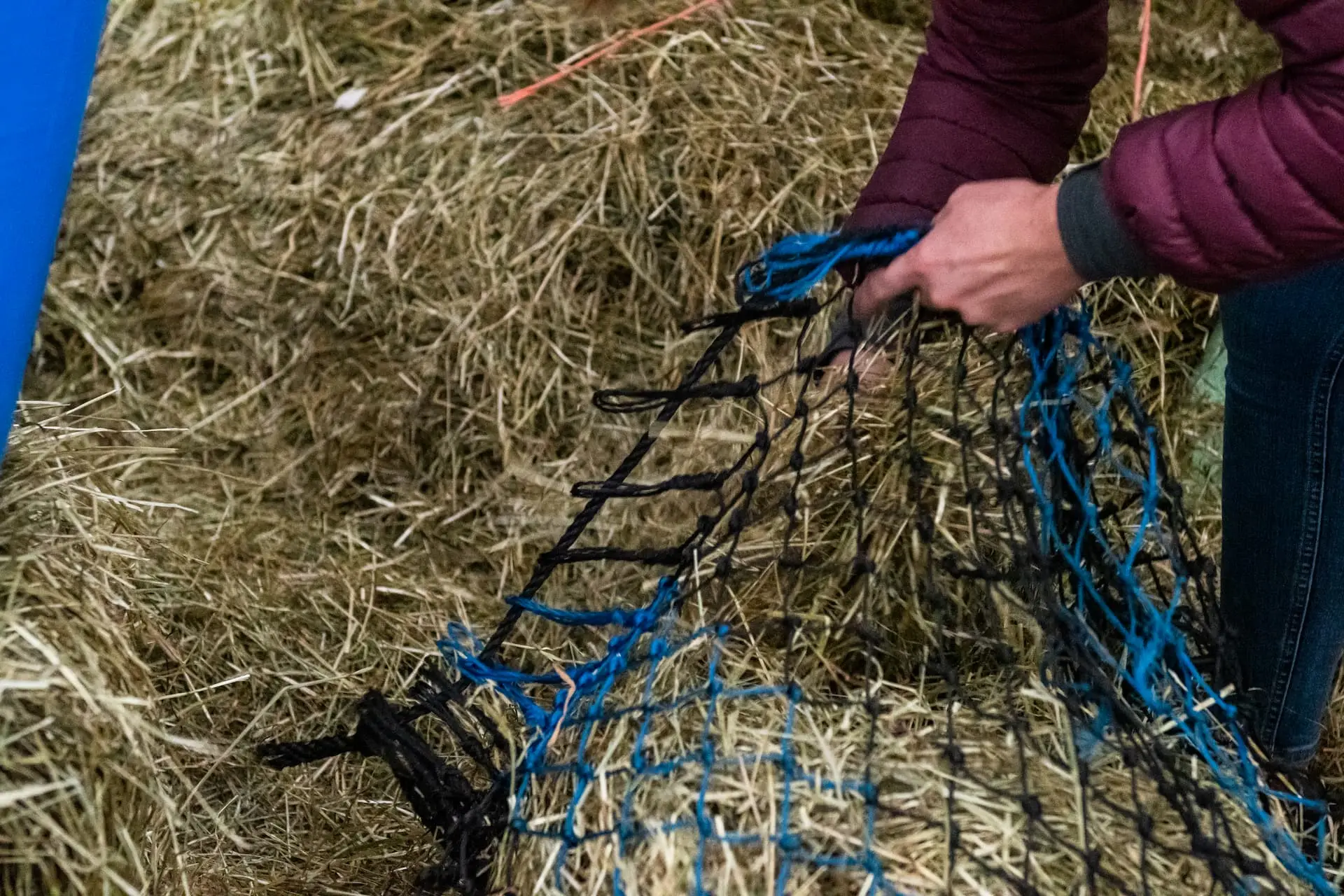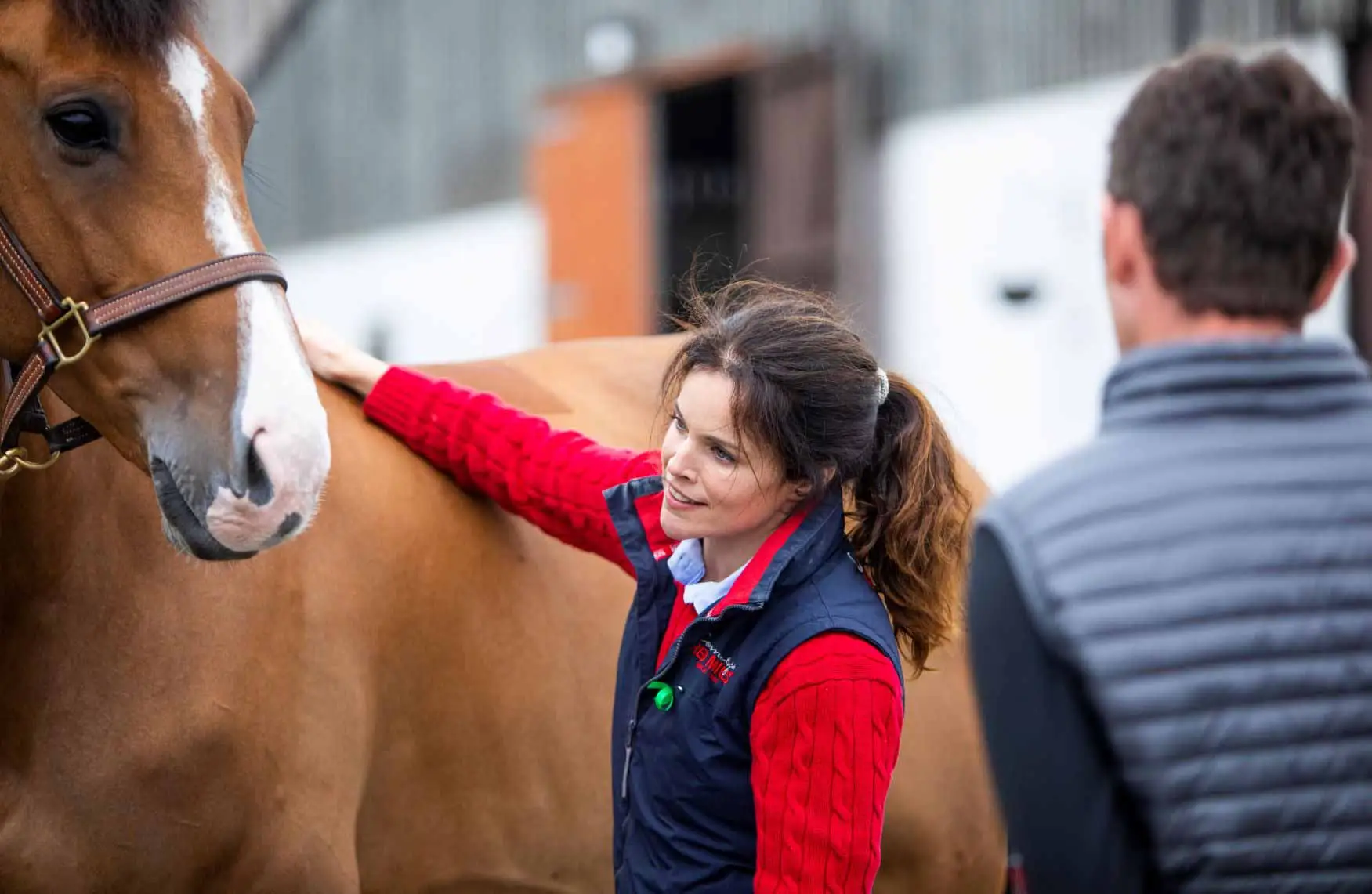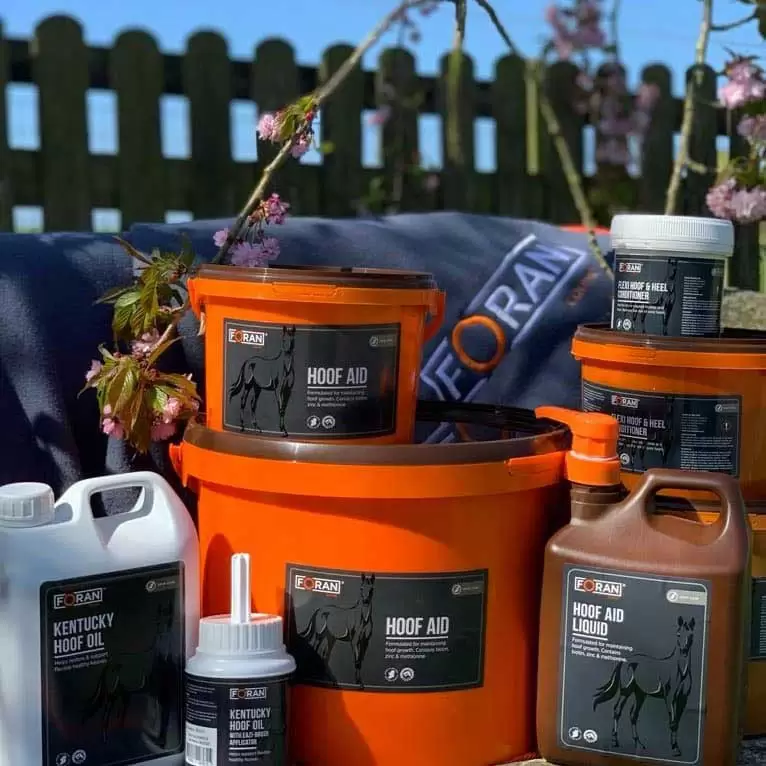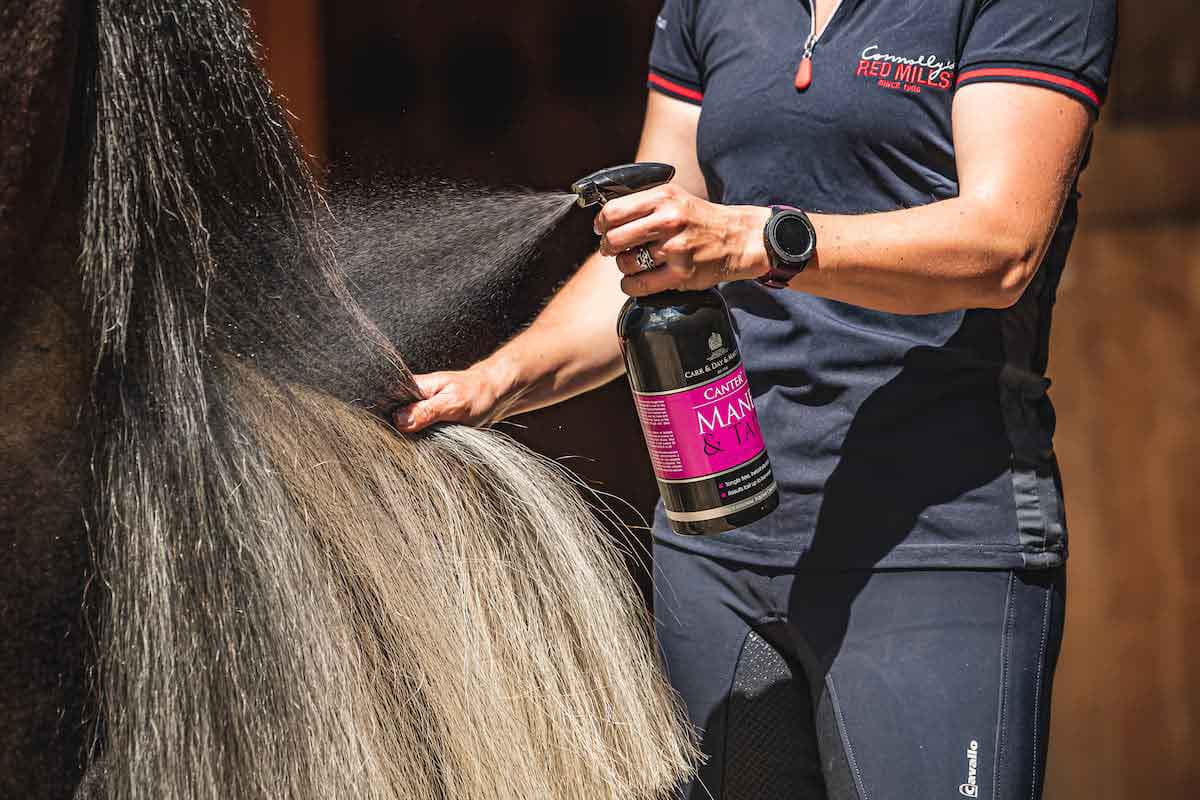Why is considering diet and nutrition important in winter?
The longer nights, plummeting temperatures and wet conditions mean that caring for our horses is more challenging and takes a little extra effort. So now is an excellent time to re-evaluate your horse’s diet and management to ensure they remain healthy and in optimal condition over the upcoming months.

Assessing your horse’s weight and condition regularly during the winter is extremely important. The easiest way to monitor your horse’s weight is to use a weigh-tape every few weeks. Although this might not be accurate in terms of your horse’s exact weight, it will help you monitor if they are gaining or losing weight. In addition to weighing your horse, you should also assess their body condition score (BCS) regularly. When evaluating your horse’s BCS remember to feel the body, not just look at it – thick, woolly winter coats or heavy rugs can often hide weight loss, and you don’t want to be surprised when your horse sheds its winter coat in the spring!
Although horses are very adaptable to cold weather, they will burn more calories just staying warm and as a result can lose weight during the winter. If your horse is losing too much weight you will need to increase the calorie content of the diet. This can be achieved by ensuring high quality forage (hay/haylage) is fed ad lib, feeding the recommended amount of a suitable hard-feed and/or adding some extra oil to the ration. On the other hand, if your horse is a “good-doer” winter can be the ideal time to allow their condition to drop off naturally, meaning that they can safely gain a little weight the following spring.
For many horses winter means spending more time in their stable and turn out, if allowed, is often restricted. However, even just a few hours in the paddock can be immensely beneficial for your horse. It will get their circulation going, provide an outlet for any pent-up energy, can help to reduce anxiety and enable them to socialise.
If your horse is stabled for the majority of the time they will require a plentiful supply of preserved forage (i.e. hay or haylage) to help satisfy their appetite, avoid boredom and ensure their digestive system remains healthy. A horse that is living out will also need supplemented forage to compensate for the reduction in grass quality and quantity during the winter. Feeding plenty of forage during the winter months will not only help your horse maintain condition, but it will also help to keep your horse warm. This is because the microbes and bacteria in the horse’s hind-gut produce heat when fermenting forage – acting just like an internal heating system.
Ideally, you should provide your horse with hay or haylage ad lib (i.e. as much as they will eat). However, if your horse is a “good-doer” feeding good quality ad lib forage may result in excessive weight gain. In these cases, it’s important not to overly restrict forage intake as this can increase the risk of problems such as colic, gastric ulcers and stereotypical behaviours. Instead, choose a late-cut variety of hay and soak it for 12 hours to further reduce its calorie and sugar content. If you find that you are still struggling with your horse’s weight, forage intake can be restricted slightly (i.e. 1.5% of bodyweight or approximately 7.5-8 kg of hay/day for a 500kg horse). Aim to feed a small hay net several times throughout the day and last thing at night. Double netting, using small-holed hay nets, can also be a handy tactic to slow down quick eaters.
Hard Feed and Supplementation
The amount of hard-feed your horse needs during the winter will depend on their weight, condition and workload. For example, a hunter in hard work will typically require significantly higher levels of hard-feed compared to a horse that’s only ridden at weekends.


Feeding the ‘Good-Doer’
A good-doer’s calorie requirement may be met by forage alone, but a balancer will be required to ensure your horse receives optimal levels of all the essential vitamins and minerals, necessary for overall health.
Feeding RED MILLS PerformaCare Balancer will help to meet the nutritional deficiencies of forage and ensure that your horse receives a highly concentrated source of amino acids (protein), and vitamins and minerals – including elevated levels of biotin as well as digestive support. Feed balancers are designed to be fed at a much lower rate than normal mixes and cubes (i.e. 100g/100kg bodyweight or roughly two tea cups/day for a 500kg horse) and so provide fewer calories making them ideal for easy keepers and horses in light work.
An alternative to feeding a balancer to a good-doer on a forage-based diet is the use of a nutrient dense supplement. Foran Equine Chevinal is a highly palatable liquid which will provide vitamins, minerals, and essential amino acids in each dose. It is suitable to syringe orally or it can be mixed and fed with concentrate feed.
Feeding for Weight Gain
At the other end of the scale, horses that tend to lose weight over the winter can be equally challenging to feed. To help maintain weight and condition these horses will benefit from a feed specifically formulated to promote weight gain and support muscle development such as our Conditioning Mix. This highly palatable, oat-free muesli is high in calories, provides excellent levels of energy-dense oil, and contains high quality protein. Poor doers will benefit from being fed several small meals of Conditioning Mix, the daily ration should be divided into two or three meals spaced throughout the day (i.e. no more than 2kg per meal for a 500kg horse).
When feeding for weight gain, it is important not to over-feed and keep meal sizes small to avoid digestive issues. Define & Shine is a high-calorie pellet rich in amino acids and omega-3 oils formulated to help promote extra condition and muscle definition. This oat-free, low starch pellet is ideal for adding extra calories without increasing meal sizes too much. General feeding guidelines are 100g/100kg bodyweight (i.e roughly two cups per day for a 500kg horse). It is important that horses are already receiving a fully balanced ration and Define & Shine is used as a top-dress pellet and not the sole base of the diet.
Feeding a conditioning mash can also be beneficial when trying to gain weight, particularly in the Winter. Comfort Mash is a quick soaking, bran mash that is fully balanced with vitamins and minerals and can be used as an alternative to a typical ‘hard feed’. This can be particularly helpful for older horses with poor dentition or any horses that struggle with chewing their food properly. Comfort Mash is also beneficial for stimulating appetite in fussy eaters and can also help support hydration and gut motility. Comfort Mash is easily mixed with one part warm water to one part mash and allowed to soak for 15 minutes prior to feeding.
Boosting the calorie density of your hard feed can also be achieved through the addition of oil such as Foran Equine Kentucky Karron Oil. Oil is a fantastic source of ‘non-heating’ calories and choosing an oil rich in Omega-3 fatty acids can also help to achieve good coat condition, promote healthy joints, and benefit reproductive health.


Feeding for Temperament
Spending long hours in the stable may mean that your horse becomes highly strung, particularly if they already tend to be very “fizzy” in nature. Nervous, anxious or stressed horses often “waste energy” and consequently lose weight. In these situations, feeding a diet that is high in digestible fibre and oil but low in starch, can be extremely beneficial. Horse Care Ultra is a cereal-grain free, ultra-low starch (only 4%), conditioning feed that provides controlled energy from a unique blend of super fibres and added oils. Horse Care Ultra also contains a long-lasting gastric acid buffer, yeast, and prebiotics to help support digestive function and reduce the risk of stress-associated gastrointestinal problems.
If turn-out is limited and your horse is still struggling to adjust to the increased time spent indoors, they may benefit from a calming supplement such as Foran Equine’s Nutri-Calm. This calming syrup can be given daily to support nervous horses while adjusting to new situations.
Horses will often reduce their water intake as temperatures fall, this combined with a drier diet (i.e. less grass and more conserved forage) can lead to an increased risk of impaction colic. It’s important to regularly check your horse’s water source and where possible keep the water source warm. Researchers have noted that water warmed to four degrees Celsius results in greater water intake. If you are concerned about your horse’s water intake try adding hot water to the water buckets a couple of times each day or consider installing a tank heater.
Shelter and Rugs
The mountain of different rugs have definitely appeared outside most stables at this stage and the most frequently asked questions are – does my horse need a rug and if so, how many? Many horses can live quite happily outside all winter providing they have adequate shelter from the elements, are rugged (if needed) and have a regular supply of forage and hard-feed.
If your horse has gained a little too much weight during the spring and summer, winter is the perfect time to kick start weight loss. The colder weather will mean that your horse burns off some of their excess weight keeping warm, so if possible try not to rug them or use a light weight, breathable rug to prevent them getting too wet and muddy. However, horses that have a low BCS, those prone to weight loss and horses that are clipped will all need rugs.
With winter feeding, as with many things, preparation is the key.




